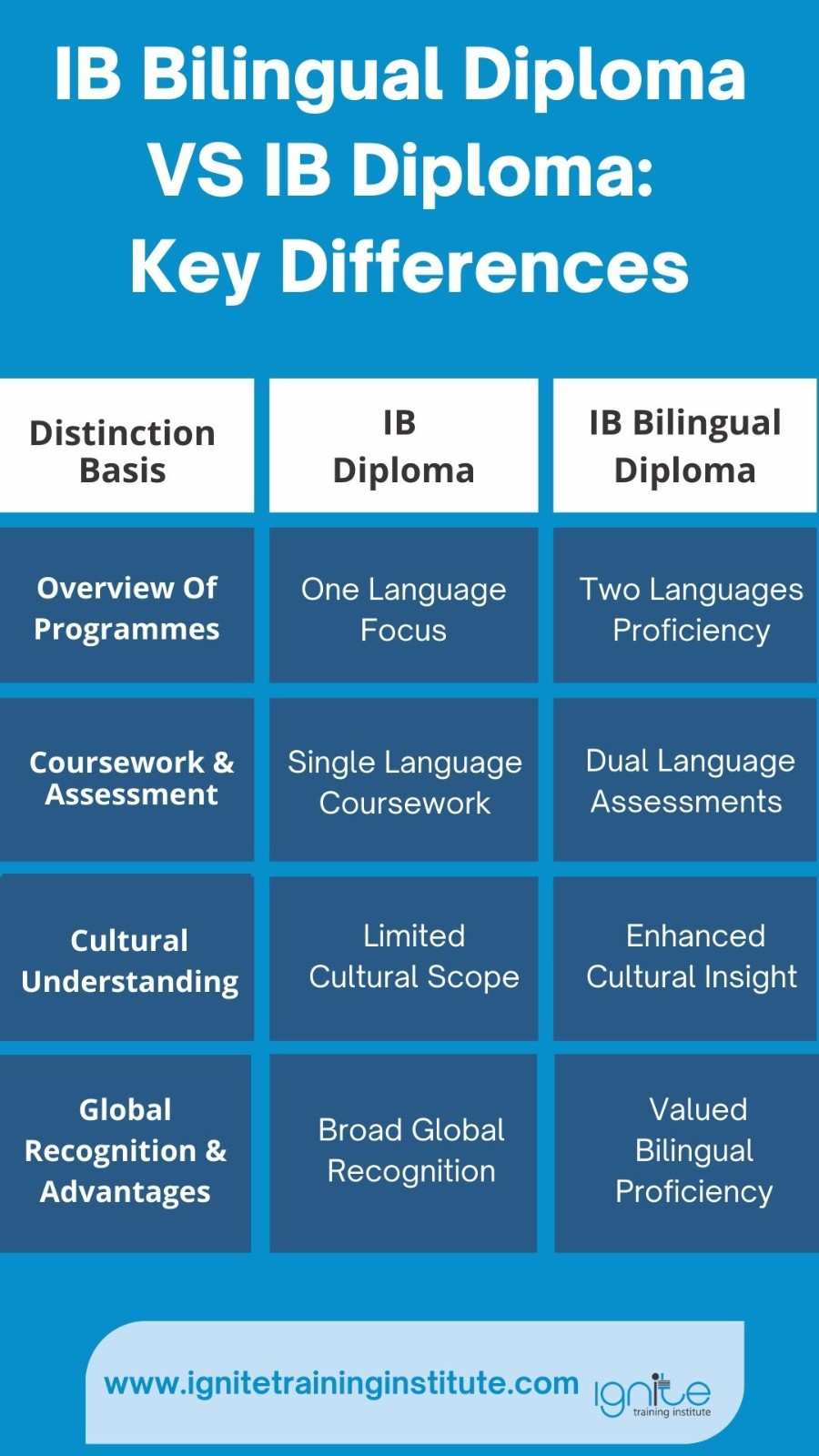The IB Bilingual Diploma is a prestigious qualification offered by the International Baccalaureate (IB) that recognizes a student’s ability to excel academically in two languages. This unique diploma not only highlights a student’s linguistic proficiency but also demonstrates their ability to think critically and navigate multicultural contexts.
With its global recognition, the IB Bilingual Diploma opens doors to top universities and provides a strong foundation for future careers in international fields.
For students pursuing the IBDP Programme,Ignite Training Institute in the UAE offers a dedicated IBDP Tutoring Program. Our expert tutors provide personalized support, ensuring students master both requirements and subject content to excel in their exams.
What Is The IB Bilingual Diploma?
The IB Bilingual Diploma is a prestigious qualification awarded to students who successfully demonstrate proficiency in two languages within the International Baccalaureate (IB) Diploma Programme. To earn the bilingual diploma, students must complete two language subjects from Group 1 (Studies in Language and Literature), achieving a minimum grade of 3.
Alternatively, they can take one subject from Group 3 (Individuals and Societies) or Group 4 (Sciences) in a language different from their Group 1 language and also secure a minimum grade of 3 in both subjects.
This diploma is particularly valuable as it reflects not only the student’s academic capabilities but also their linguistic and cultural adaptability. It is recognized by universities worldwide and provides students with an advantage in global higher education and career opportunities, especially in fields that value multilingual communication and cultural competency.
The bilingual diploma is a testament to a student’s ability to succeed in rigorous academic environments while excelling in multiple languages.
Related: What Is An IB World School? All You Need To Know
IB Bilingual Diploma Requirements
The IB Bilingual Diploma is a prestigious qualification awarded by the International Baccalaureate (IB) to students who demonstrate proficiency in two languages. To earn this diploma, students must meet specific academic criteria that go beyond the standard IB Diploma Programme.
1. Dual Language Proficiency
To be eligible for the IB Bilingual Diploma, a student must:
- Complete two languages selected from Group 1 (Studies in Language and Literature) with a grade of 3 or higher in each.
- Alternatively, a student may complete one language from Group 1 and another subject (such as a Group 3 subject like History or a Group 4 subject like Biology) taught in a different language, provided they score 3 or higher in both subjects.
2. Subject Selection
Students pursuing the bilingual diploma are required to select at least two languages from the Group 1 subject list, such as:
- First language (usually the student’s native language).
- Second language (could be a language of instruction or another language in which the student is proficient).
In cases where students take interdisciplinary subjects (e.g., Environmental Systems and Societies) in a second language, these subjects can also contribute toward the bilingual diploma.
3. Extended Essay & Theory Of Knowledge
While the Extended Essay (EE) and Theory of Knowledge (TOK) are crucial elements of the IB Diploma Programme, they do not directly contribute to the award of the bilingual diploma. However, excelling in these components can still contribute to the overall IB diploma points.
4. Meeting Assessment Criteria
The IB Bilingual Diploma has a rigorous grading system, where students must:
- Earn at least 24 points in total across six subjects.
- Score at least a Grade 3 in both the languages required for the bilingual diploma.
- Meet all other core requirements of the IB Diploma, including participation in Creativity, Activity, Service (CAS) projects.
Related: IBCP VS IBDP: 5 Differences To Make An Informed Choice
IB Bilingual Diploma VS IB Diploma: Key Differences

The International Baccalaureate (IB) Diploma Programme offers students a well-rounded, internationally recognized education, but within this, students may also opt for the IB Bilingual Diploma, which caters to those with strong linguistic abilities.
Below is a comparison of both diplomas to help students and parents understand the nuances and benefits of each.
1. Overview Of The Programmes
- IB Diploma: Students study six subjects, with one subject from each group, including one language subject (Language A). The standard IB Diploma requires fluency in one language, typically the student’s first language or a language of instruction.
- IB Bilingual Diploma: In contrast, the IB Bilingual Diploma is awarded to students who demonstrate advanced proficiency in two languages. This can be achieved by taking two Language A subjects from different language groups or by studying one subject from Group 3 or 4 in a language other than the student’s Language A.
3. Coursework & Assessment
- IB Diploma: Students focus on one primary language and choose subjects from the IB curriculum based on personal interest or future academic goals. All courses are typically completed in the same language (usually the language of instruction).
- IB Bilingual Diploma: Students engage with coursework in two languages, ensuring a deeper understanding of both. They must demonstrate competency by completing exams and assessments in both languages, showing their ability to analyze and communicate effectively in diverse linguistic contexts.
3. Cultural Understanding
- IB Diploma: Students gain a broad, international outlook through their subject choices and the Theory of Knowledge (TOK) course, but cultural insights are typically focused on one language.
- IB Bilingual Diploma: By studying in two languages, students deepen their cultural understanding and become adept at navigating and appreciating diverse linguistic and cultural environments, fostering greater empathy and global awareness.
4. Global Recognition & Advantages
- IB Diploma: The IB Diploma is widely recognized by universities across the globe and prepares students for further education with its well-rounded curriculum. Students gain critical thinking, research, and problem-solving skills but focus primarily on one language.
- IB Bilingual Diploma: This diploma showcases the student’s multilingual proficiency, making them stand out in a globalized world. Bilingualism is highly valued by universities and employers, especially in international careers such as diplomacy, global business, or international law.
Related: IB Grades Explained For Top US & UK University Admissions
Grading System Of The IB Bilingual Diploma
The grading system for the International Baccalaureate (IB) Bilingual Diploma is designed to reflect a student’s academic performance across various subjects and core components. Here’s an overview of how the grading system works:
1. Scoring Structure
- Subject Grades: Each of the six subjects taken in the IB Diploma Programme is graded on a scale from 1 to 7, with 7 being the highest. The grades are awarded based on a combination of internal assessments (like coursework and projects) and external assessments (like final examinations).
- Core Components: The Theory of Knowledge (TOK), Extended Essay (EE), and Creativity, Activity, Service (CAS) also contribute to the overall diploma score, though they are not assigned individual grades on the 1-7 scale.
2. Points From Core Components
- TOK and EE: Students can earn up to 3 additional points based on their performance in TOK and their Extended Essay. The combination of their grades in these areas influences the total score. The points are awarded as follows:
- Maximum of 3 points: Depending on the grades achieved in both TOK and the Extended Essay.
3. Total Score Calculation
- The overall diploma score is calculated by adding the points earned from the six subjects (maximum of 42 points) to the points earned from the TOK and EE (maximum of 3 points), leading to a possible total of 45 points.
4. Diploma Requirements
To be awarded the IB Bilingual Diploma, students must meet the following criteria:
- Achieve a minimum score of 24 points.
- Completed all required components of the program (six subjects, TOK, EE, and CAS).
- Obtain a passing grade in both the Extended Essay and Theory of Knowledge.
Related: 10 Tips On How To Get Good Grades In IB Curriculum Exams
Is The IB Bilingual Diploma Worth It?
The IB Bilingual Diploma is highly valued for its rigor and global recognition, but whether it is worth pursuing depends on a student’s goals, interests, and future aspirations.
Here’s a breakdown of its benefits and considerations to help determine if it’s the right choice:
1. Global Recognition And University Admissions
One of the strongest advantages of the IB Bilingual Diploma is its international recognition by universities worldwide. Many prestigious institutions favor IB students due to their critical thinking skills and well-rounded education.
Holding a bilingual diploma, in particular, sets students apart as multilingual and culturally aware, which is attractive to universities and global employers. Studies have shown that bilingual diploma holders often have an edge in admissions processes for competitive universities.
2. Enhanced Cognitive Abilities
Research consistently shows that bilingualism enhances cognitive flexibility, problem-solving, and memory retention. Students who pursue the IB Bilingual Diploma develop these cognitive skills as they master academic subjects in two languages, which can lead to improved performance across disciplines.
Furthermore, the IB’s Theory of Knowledge (TOK) and Extended Essay components further sharpen critical thinking and research abilities.
3. Career Advantages
For students aiming for careers in international business, diplomacy, or global development, the IB Bilingual Diploma provides a strong foundation. Multilingualism is increasingly sought after in global workplaces, where fluency in multiple languages can open doors to leadership roles and cross-cultural collaborations.
Studies suggest that bilingual individuals earn higher salaries and have more opportunities for career advancement.
4. Cultural Awareness And Adaptability
The IB Bilingual Diploma nurtures a global perspective by encouraging students to explore literature, history, and social sciences in different languages. This exposure builds cultural competence and adaptability, skills that are vital in today’s interconnected world.
Many students who pursue the bilingual diploma report that it broadens their worldview and prepares them for studying and working abroad.
5. Challenges And Considerations
While the benefits are clear, the IB Bilingual Diploma is not without its challenges. Students need to be proficient in two languages, and the workload can be demanding. The extended essay, combined with regular coursework, exams, and extracurriculars (CAS—Creativity, Activity, Service), can be intense.
Therefore, students must be committed to managing their time effectively and maintaining a balance between academic and personal life.
Related: CBSE Or IB Board: Comparative Analysis & Popular Facts
Do Universities Accept IB Bilingual Diploma?
Yes, universities around the world widely accept the IB Bilingual Diploma. Many institutions view it as a strong indicator of a student’s academic prowess and language proficiency.
The IB Bilingual Diploma showcases not only mastery of two languages but also a student’s ability to think critically and perform academically in diverse linguistic contexts—skills highly valued in global higher education environments.
This makes graduates stand out in competitive admissions processes, especially for programs that emphasize international relations, linguistics, or global business.
Top universities that accept the IB Bilingual Diploma include prestigious institutions such as Harvard University, University of Oxford, University of Toronto, Australian National University (ANU), and ETH Zurich.
These schools, along with many others, recognize the diploma’s rigorous academic standards and the unique advantage it gives students entering multilingual or multicultural settings.
Related: Top 10 Leading IB Schools in Abu Dhabi: 2024 Review
Helpful Tips For Parents Of Students Pursuing An IB Bilingual Diploma
The International Baccalaureate (IB) Bilingual Diploma offers students a unique opportunity to develop proficiency in two languages while gaining a global perspective. As a parent, you play a crucial role in supporting your child through this rigorous program. Here are some helpful tips to guide you:
1. Understand The IB Program Structure
Familiarize yourself with the IB curriculum, especially the requirements for the bilingual diploma. This includes understanding the different subjects offered, the assessment criteria, and the importance of language development. Having a clear understanding will help you support your child’s academic journey more effectively.
2. Encourage Language Use At Home
Promote the use of both languages at home. Encourage conversations, reading, and even writing in both languages. This not only reinforces their learning but also helps your child feel more confident in using both languages in different contexts.
3. Create A Balanced Study Environment
Designate a quiet and organized study area where your child can focus on their studies. Ensure they have access to the necessary resources, such as books, online materials, and language tools. A distraction-free environment can significantly enhance productivity.
4. Support Extracurricular Activities
Encourage your child to participate in extracurricular activities that involve both languages, such as language clubs, cultural events, or international exchanges. These experiences can provide practical language use and deepen cultural understanding.
5. Promote Effective Study Habits
Help your child develop effective study techniques. Encourage them to create a study schedule that balances language practice with other subjects. Techniques like flashcards, language apps, and group study sessions can be beneficial.
6. Explore Cultural Contexts
Engage with the cultural aspects of the languages your child is studying. This can include cooking traditional dishes, watching films, or attending cultural festivals. Gaining an understanding of the culture tied to a language deepens the learning experience.
Related: 10 IB Learner Profile Attributes Shaping Your Future
Join The IBDP Tutoring Program At UAE’s Ignite Training Institute
Unlock your potential with Ignite Training Institute’s IBDP Tutoring Program in the UAE. Our dedicated tutors—highly experienced in the IB curriculum—provide tailored support to help students excel in every aspect of the IBDP.
From mastering complex subjects to developing critical thinking skills, we ensure that the student not only achieves top scores but also gains the confidence to succeed in their academic journey and beyond.
Join us today and experience a supportive environment that fosters academic success and builds your confidence for the future!
Related: IB Computer Science Syllabus: HL & SL Complete Overview
FAQs
1. What Is A Bilingual IB Diploma?
A Bilingual IB Diploma is an International Baccalaureate diploma that requires students to study and complete assessments in two languages. This program enhances language proficiency and cultural understanding.
2. Is A Bilingual IB Diploma Better?
A Bilingual IB Diploma can be advantageous as it demonstrates advanced language skills and cultural awareness, which may enhance college applications and opportunities in multilingual environments.
3. What Is The Equivalent Of IB Diploma In India?
The equivalent of the IB Diploma in India is the Class 12 certificate from the Indian School Certificate (ISC) or the CBSE (Central Board of Secondary Education).
4. What Is An IB Diploma Equivalent To?
The IB Diploma is generally considered equivalent to other international qualifications such as the A Levels in the UK or the Advanced Placement (AP) program in the USA, reflecting similar academic rigor.
Conclusion

In conclusion, the IB Bilingual Diploma offers students a unique opportunity to enhance their language skills and cultural awareness through a rigorous academic framework. By studying in two languages, students not only improve their linguistic proficiency but also gain valuable insights into diverse perspectives, preparing them for success in a globalized world.
This diploma is an excellent choice for those seeking to stand out in higher education and beyond, showcasing both academic excellence and cultural competence.
Related: How To Study For IB Exams? 10 Preparation Tips That Work


